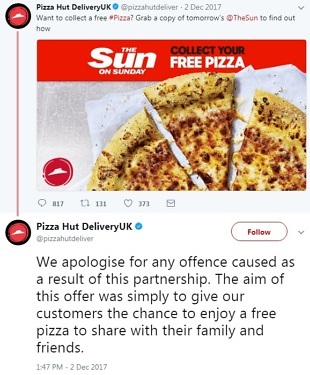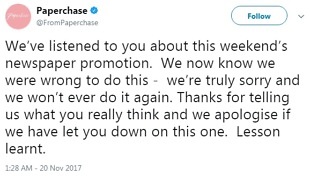How do you protect your brand from keyboard warriors?

A couple of major brands took a battering on social media at the end of last year from people complaining about their marketing tie-ups with two national newspapers, papers the protesters accuse of promoting “hate speech”. Fast food chain Pizza Hut got into trouble when giving away free pizza to readers of The Sun on Sunday, while stationery store Paperchase stirred up the twittersphere with a Christmas wrapping paper offer in the Daily Mail.
This kind of Twitter activism is nothing new, with campaign group @StopFundingHate in particular mobilising its followers to target brands that advertise in the Mail, Sun and Express, protesting at the tone of coverage on issues such as asylum seekers and Brexit. The hashtag #DontBuyTheSun is regularly aimed at brands and people appearing in the paper, a continuing protest at its coverage of the Hillsborough disaster.
What is interesting are the different responses by the two brands involved in this latest online spat. Pizza Hut was quick to apologise for any offence the partnership with The Sun caused, but didn’t pull the promotion. Paperchase, however, fell on its sword completely, tweeting “we’re truly sorry and we won’t ever do it again.” Paperchase’s reaction earned it a rebuke from the Mail, which said “what message [are they] sending to the four million people who read the Daily Mail, many of whom will be their customers?”

Unfortunately for both companies their apologies didn’t draw a line under the matter. Protests rumbled on, while proponents of free speech and the “political correctness gone mad” brigade also piled in to Pizza Hut and Paperchase, accusing them of caving in to online complaints. Both stories made their way in to the mainstream media, amplifying and prolonging the issue.
So, should we all be wary of the keyboard warriors who could target our brands and set fires burning on social media, inevitably creeping into the traditional media? In a world where the President of the United States is happy to carry out diplomacy via Twitter, the answer is absolutely yes!
Social media is now the frontline where people talk about news and issues, exchange opinions and experiences, and where reputations can be built and just as quickly damaged. But that doesn’t mean we should all run scared of social media – brands need to adapt to the new world and be ready.
A few years ago when I was Head of Social Media at Nationwide Building Society we were targeted in a campaign led by @EverydaySexism because our Facebook adverts were appearing on pages that seemingly promoted violence against women. We immediately pulled our ads and did not return to Facebook until the platform changed its policies.
The reason we were able to respond to the issue so swiftly to protect Nationwide’s reputation was because I had put a crisis management plan in place. A Twitter storm will eventually die down, but the longer you take to act, the longer it will last and the more damaging it could be.
Here are my top five tips for helping to protect your company in a social media storm:
- Be prepared: Get all your relevant stakeholders – PR, marketing, compliance, legal, customer services – aligned so they are ready to respond to an issue as soon as it happens. And make sure they’re available 24/7 because social media isn’t 9 to 5.
- Plan ahead: Develop a playbook of how to respond to the most likely incidents, such as customer complaints, IT or service problems, along with basic pre-prepared social responses. Crucially, agree ahead of time who is going to be responsible for deciding how to respond.
- Keep the PR team informed: If your social media team isn’t part of your PR function – which begs the question, why not? – then ensure you make them aware of marketing plans, social media activity and potential issues as early as possible. At its heart, social media is no different from any other form of public relations, so your PR team will view everything through the prism of reputation and will advise on the risks and responses.
- Be quick, but not hasty: The temptation when faced with a few difficult comments on social media is to apologise and pull the plug on any activity. But the scale and type of comments might not be that bad, so a holding statement along the lines of “we’re looking into this” should give you enough breathing space to assemble your team, review the issue and agree a considered response.
- Be brave, not stupid: Social media is a powerful medium because it can help you engage with customers in a way that traditional media and marketing can’t. To make it work you must enter into a proper two-way relationship with your audience. But always consider the risk of a fall out on social media when planning any activity and ensure you respond to comments in an honest way. Feeding people rubbish, telling them half-truths or ignoring their questions will only provoke more anger on the world’s most visible communications channels.
Paul Beadle is MRM’s Head of Social Media and Digital Communications – you can follow him on Twitter @PaulBeadle and MRM on @TweetsizedMRM
